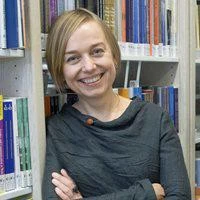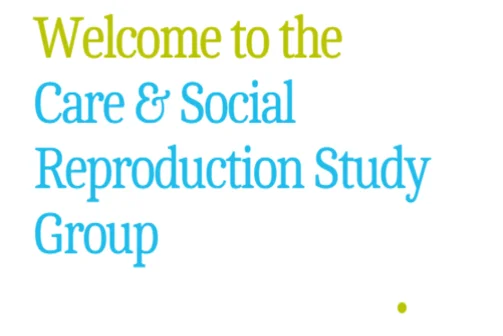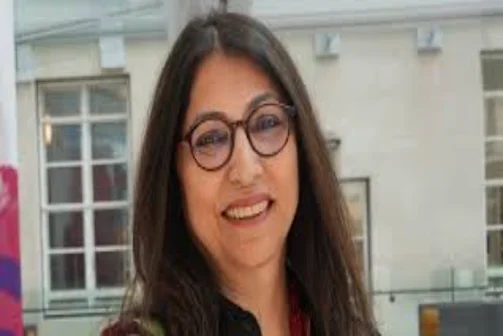
Connect
About
Dr Ania Plomien is Associate Professor in Gender and Social Science.
Please note that Ania is on sabbatical leave in 2025-26.
Dr Plomien's research falls within the tradition of feminist political economy. She is interested in understanding the micro and macro level processes that shape gender inequality in relation to social reproduction, care and employment, transnational labour mobility, and the policy processes, especially neoliberalisation of the state, that affect them.
She researches the ways in which inequalities in access to and command over resources and power are experienced and how they get produced, reproduced, and challenged through everyday relations in paid and unpaid work and care and the role of policy interventions in these domains. Examining these problems in contemporary Europe, she variously traces the trans-, supra-, and national as well as local developments. In particular, her research concerns (a) socioeconomic policies at national and supra-national governance, including in Poland, in the UK and at the EU level; (b) social transformations in the Central and East European region, especially in Poland and Ukraine; and (c) micro-level, often transnational, experiences and practices in negotiating gender, class and migration in paid and unpaid work.
These research interests translate into a range of engagements with academic, civil society and policy making actors. Among others, she co-convenes the BSA Care and Social Reproduction Study Group, is a Deputy Director of the Gender Justice and the Wellbeing Economy research programme, a member of the Policy Advisory Group of the Women’s Budget Group, and has as an editorial board member of Work, Employment, and Society (2012-2016), and and has been an expert in the European Commission’s Network of Experts on Gender Equality (2005-2014). At the LSE, she is a a faculty associate at the International Inequalities Institute.
Expertise
gender; feminist political economy; social reproduction; care; work and employment; transnational labour mobility; work-family policy; post-socialism; Central Eastern Europe; EU.
Research
Gender and Diversity Policies in Banking and Finance: Moving towards Greater Inclusion? (current)
Over the last few years, but particularly since the 2008 financial crisis, gender and diversity issues have gained visibility in business, political, and academic spheres and in public debates at national and international levels. The UK government has introduced a range of policies and programmes to improve the gender balance of the workforce, especially at senior levels, while a range of consultancies and financial sector firms emphasise the business case for greater diversity. Given this context, the study (in collaboration with Professor Diane Perrons, LSE) focuses on contemporary workplace practices and workers experiences in banking and finance, zooming on the processes that support as well as inhibit the development of a more diverse and gender balanced workforce.
Production, social reproduction and mobility nexus in uneven and combined Europe (current)
Labour mobility forms an integral part of the gendered political economy of contemporary uneven and combined European capitalism. This collaborative study (with Dr Gregory Schwartz, University of Bristol) interrogates the ways in which labour migration from Ukraine to Poland, and from Poland to the UK, co-constitutes capitalist production and social reproduction. Concentrating on the gendered aspects of work and labour in the sectors of housing construction, food production, and care provision, the project analyses the struggles and contradictions of various actors involved in the day-to-day realities of their lives and livelihoods.
Brexit and the crisis of the European Social Model? (2016-2018)
The UK Referendum debates, just like EU policies, have emphasised the economic consequences of Brexit, and less so its potential social impact, even though the economic and the social are so tightly bound. The analysis of the EU social dimension, including the new Pillar of Social Rights, highlights the persistence of the tension between, on the one hand, the value of the EU social and gender equality framework, and, on the other, the subordination of social and gender equality objectives to neoliberal macroeconomic policy-making. This tension resonates with a recurring feminist dilemma of reconciling a critical stance towards state power with action for progressive change. Despite serious concerns over social and gender policies and politics, evident in the resilience of inequalities across the EU, scepticism about the UK’s withdrawal from the EU dominates over optimism. It is difficult to identify any meaningful gains of Brexit for the UK, and it is not (yet) clear that the UK’s departure from the EU will make matters easier for social and gender progress in Europe.
Gender Analysis of Labour Market Outcomes in Poland, Romania and Russia (2013-14)
This study (with Monika Potoczna) used micro data from labour force and household surveys to explore differences in labour market outcomes by sex, age, marital/parental status, and other relevant stratifiers. It aimed to gain a nuanced picture of changes in women’s and men’s labour force participation and its quality over time. The background paper from the study ‘Gender analysis of labour market outcomes in Poland, Romania and Russia in the 2000s’ (2014) contributed to the UN Women Report ‘Progress of the Worlds Women 2015-2016: Transforming economies, realising rights’ (2015).
Gender Equality and Gender Mainstreaming in Employment and Social Policies (2005-2014)
Since 2005 I have been involved in an annual programme of policy research and analysis for first the Employment and Social Affairs Directorate and subsequently for the Directorate General Justice of the European Commission as the National Expert for Poland in the European Network of Experts on Gender Equality (formerly EGGE and EGGSIE). This research centres on a critical assessment of national policies and the extent to which they promote gender equality in the employment and social spheres, and contributes to policy-making processes through commenting on and interacting with national and EU-level policy makers, including exchange of best practice seminars and reports for the European Commission, the Parliament, and other stakeholders.
Private Bank: Workplace Culture and Gender Balance (2010-2011)
This research (with Diane Perrons) conducted at a private bank investigated the factors inhibiting the development of a more gender balanced workforce, in particular in senior positions, in an organisation explicitly interested in raising the proportion of women in top management.
Socio-Economic Inequalities and Policy in the EU (2010)
This research (with Diane Perrons) was conducted in light of increasing research that since the mid-1970s socio-economic inequalities have increased across many countries, including in Europe. It was based on an extensive review of 13 research projects financed by DG Research under Framework Programme 6 that investigated the processes underpinning inequality, poverty and exclusion and the extent to which strategies put in place to promote social cohesion and inclusion are effective.
The main findings have been published in the report: ‘Why socio-economic inequalities increase? Facts and policy responses in Europe’ (2010) Available here:http://ec.europa.eu/research/social-sciences/pdf/policy-review-inequalities_en.pdf
Situating men within global care chains: the migrant handyman phenomenon (ESRC 2008-9)
Led by Majella Kilkey (Principal Investigator) and with Diane Perrons (Advisor), in this research we explored situations in which households outsource traditionally male chores, such as household and garden maintenance and repairs. Based on quantitative and qualitative research, the study obtained and analysed new information on the characteristics of employment of migrant handymen in the UK; on how the use of migrant handymen affects employing households' work, family and leisure practices; on migrant handymen's work and family biographies, and their experiences of being a migrant.
Teaching
Teaching
- GI415 Gender and Welfare Regimes: Developments and Change
- GI418 Feminist Economics and Policy: An Introduction
PhD supervision
Prospective PhD Supervision
I am interested in supervising research projects in interdisciplinary, feminist political economy perspectives on topics covering gender, migration, social reproduction, care and employment, social change in post-socialist contexts, in particular:
- gender division of paid and unpaid labour and care
- migration and labour mobility
- changing nature and conditions of work and employment
- gender and transformation of social relations during and after socialism
- social and economic policy interventions for social transformation - such as family, care, labour market, austerity, marketisation, Brexit
Current
Magda Muter: Household division of labour and gendered social transformation in Poland (Supervisor, with D. Perrons advising)
Malena Bastida-Antich: The racialized and gendered occupational segregation around care and domestic work in Spain through the lens of social reproduction theory (Supervisor, with L. Sabsay advising)
Alice Bell: De/familising care? ‘Community power’ and the political economies of welfare in English local government (Supervisor, with S. Parmanand advising)
Completed
Aynura Akbas: Exclusion and Inclusion in the Military: Uncovering Oral Narratives of Women Soldiers and Veterans of 1992-1995 Bosnian War (Supervisor, with A. Holvikivi advising and M. Henry externally advising)
Zuzana Dancikova: Father’s leaves and sharing of paid and unpaid work in Slovakia (Co-supervisor with W. Sigle, awarded 2024)
Hannah Wright: Gendered organisational cultures and discourses in foreign policy-making institutions (Advisor, project supervised by M. Henry, awarded 2021)
Aiko Holvikivi: Fixing gender: the paradoxical politics of peacekeeper training (Advisor, project supervised by M. Henry, awarded 2019)
Aura Lehtonen: The Sexual and intimate life of UK austerity politics (Advisor, project supervised by C. Hemmings, awarded 2018)
Magdalena Mikulak: Politics of sexuality in neoliberal(ised) times and spaces: the LGBT movement, Christian LGBT organising and reparative therapy in contemporary Poland (Supervisor, with C. Hemmings advising, awarded 2017)
Yang Shen: Transforming life in China: gendered experiences of restaurant workers in Shanghai (Advisor, project supervised by D. Perrons, awarded 2015)
Harriet Gray: Militarism in the everyday: responses to domestic abuse in the British Armed Forces (Advisor, project supervised by M. Henry, awarded 2015)

